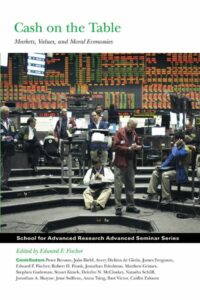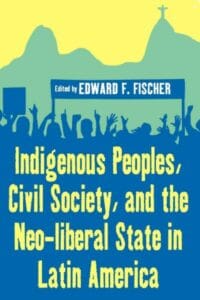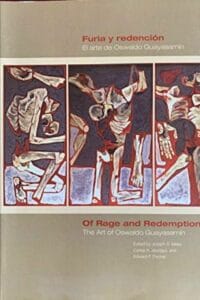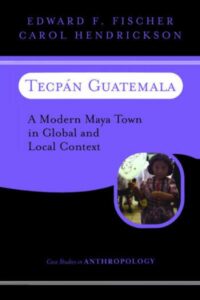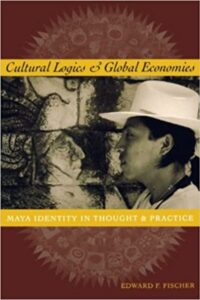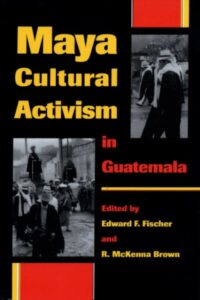Making Better Coffee
How Maya Farmers and Third-Wave Tastemakers Create Value
by Edward F. Fischer
What justifies the steep prices commanded by small-batch, high-end Third Wave coffees? Making Better Coffee explores this question, looking at highland coffee farmers in Guatemala and their relationship to the trends that dictate what makes “great coffee.” Traders stress material conditions of terroir and botany, but just as important are the social, moral, and political values that farmers, roasters, and consumers attach to the beans.
In the late nineteenth century, Maya farmers were forced to work on the large plantations that colonized their ancestral lands. The international coffee market shifted in the 1990s, creating demand for high-altitude varietals—plants suited to the mountains where the Maya had been displaced. Edward F. Fischer connects the quest for quality among U.S. tastemakers to the lives and desires of Maya producers, showing how profits are made by artfully combining coffee’s material and symbolic attributes. The result is a complex story of terroir and taste, quality and craft, justice and necessity, worth and value.
The Good Life
Aspiration, Dignity, and the Anthropology of Wellbeing
by Edward F. Fischer
What could middle-class German supermarket shoppers buying eggs and impoverished coffee farmers in Guatemala possibly have in common? Both groups use the market in pursuit of the “good life.” But what exactly is the good life? How do we define wellbeing beyond material standards of living? While we all may want to live the good life, we differ widely on just what that entails.
In The Good Life, Edward Fischer examines wellbeing in very different cultural contexts to uncover shared notions of the good life and how best to achieve it. With fascinating on-the-ground narratives of Germans’ choices regarding the purchase of eggs and cars, and Guatemalans’ trade in coffee and cocaine, Fischer presents a richly layered understanding of how aspiration, opportunity, dignity, and purpose comprise the good life.
Cash on the Table
Markets, Values and Moral Economies
by Edward F. Fischer
A great deal is at stake in understanding the moral dimensions of economic behavior and markets. Public debates over executive compensation, the fair trade movement, and recent academic inquiries into the limitations of rational-choice paradigms all point to the relevance of moral values in our economic decision-making processes. Moral values inform economic behavior. On its face, this proposition is unassailable. Think of the often spiritual appeal of consumer goods or the value-laden stakes of upward or downward mobility. Consider the central role that moral questions regarding poverty, access to health care, the tax code, property and land rights, and corruption play in the shaping of modern governments, societies, and social movements. Ponder the meaning of fair trade coffee and organic produce as well as Walmart’s everyday low prices. The moral aspects of the marketplace have never been so contentious or consequential; however, the realm of economics is often treated as a world unto itself, a domain where human behavior is guided not by emotions, beliefs, moralities, or the passions that fascinate anthropologists but by the hard fact of rational choices.
Anthropologists have historically tended to focus on the corrosive effects of markets on traditional lifeways and the ways in which global markets disadvantage marginalized peoples. Economists often have difficulty recognizing that markets are embedded in particular social and political power structures and that “free” market transactions are often less free than we might think. If anthropologists could view markets a bit more ecumenically and if economists could view them a bit more politically, then great value—cash on the table—could be found in bringing these perspectives together.
Indigenous Peoples, Civil Society, and the Neoliberal State in Latin America
Edited by Edward F. Fischer
In recent years the concept and study of “civil society” has received a lot of attention from political scientists, economists, and sociologists, but less so from anthropologists. A ground-breaking ethnographic approach to civil society as it is formed in indigenous communities in Latin America, this volume explores the multiple potentialities of civil society’s growth and critically assesses the potential for sustained change. Much recent literature has focused on the remarkable gains made by civil society and the chapters in this volume reinforce this trend while also showing the complexity of civil society – that civil society can itself sometimes be uncivil. In doing so, these insightful contributions speak not only to Latin American area studies but also to the changing shape of global systems of political economy in general.
Of Rage and Redemption
The Art of Oswaldo Guayasamín
by Joseph S. Mella, Carlos Jáuregui, and Edward F. Fischer
Broccoli and Desire
Global Connections and Maya Struggles in Postwar Guatemala
by Edward F. Fischer and Peter Benson
This book takes a surprising look at the hidden world of broccoli, connecting American consumers concerned about their health and diet with Maya farmers concerned about holding onto their land and making a living.
Compelling life stories and rich descriptions from ethnographic fieldwork among supermarket shoppers in Nashville, Tennessee and Maya farmers in highland Guatemala bring the commodity chain of this seemingly mundane product to life. For affluent Americans, broccoli fits into everyday concerns about eating right, being healthy, staying in shape, and valuing natural foods. For Maya farmers, this new export crop provides an opportunity to make a little extra money in difficult, often risky circumstances. Unbeknownst to each other, the American consumer and the Maya farmer are bound together in webs of desire and material production.
Pluralizing Ethnography
Comparison and Representation in Maya Cultures, Histories, and Identities
by John Watanabe and Edward F. Fischer
This volume brings together eight Maya specialists and a prominent anthropological theorist as discussant to assess the contrasting historical circumstances and emerging cultural futures of Maya in Mexico and Guatemala. Rather than presume a romanticized, timeless Maya culture-or the globalized predicaments of transnationalized Maya imaginings-this seminar took its cue from contemporary Maya cultural activists who derive their enduring sense of Mayan-ness from a historical consciousness of five hundred years of cultural resilience. The contributors evaluate the history of Maya peoples and Maya anthropology by examining language, religion, political attitudes and activism, ethnographic traditions, and the relationship between economic change, migration, and cultural identity.
In comparing Maya peoples across Mexico and Guatemala, the contributors’ emphasis on culture recovers intermediate linkages between the personal and the political, the local and the global. Their work enables a controlled cross-cultural comparison across national boundaries and histories that in turn illuminates the articulation between locally constructed meanings and global transformations.
Tecpán Guatemala
A Modern Maya Town in Global and Local Context
by Edward F. Fischer and Carol Hendrickson
What does it mean to be Maya in the modern world? Focusing on a Guatemalan town, this case study explores the cultural, political, and economic changes of this society over time. This case study of a highland Guatemala town examines what it means to be Maya in a rapidly changing and globalized world. In providing an historical synopsis of the Kaqchikel Maya from preColumbian through Colonial times to the present day, this volume focuses on the use of language, dress, and crafts as emblems of ethnicity, nationality, and political allegiance.
Tecpán considers the dynamics of ethnic boundaries in light of the use of the Kaqchikel language versus Spanish, the growing role of Protestantism and the revitalization of traditional Maya religion versus Catholicism, and traditional subsistence agriculture in the face of an expanding reliance on export crops. It examines in particular the role of weaving and other indigenous crafts in linking Tecpanecos to larger economic and political orbits and for defining local, regional, and national identities. As a result, this accessibly written book demonstrates that even traditional Maya cultural forms are actively constructed in the context of intense global connections.
Cultural Logics and Global Economies
Maya Identity in Thought and Practice
by Edward F. Fischer
Drawing on recent theories from cognitive studies, interpretive ethnography, and political economy, Edward F. Fischer looks at individual Maya activists and local cultures, as well as changing national and international power relations, to understand how ethnic identities are constructed and expressed in the modern world.
A 2002 Choice Outstanding Academic Title.
Maya Cultural Activism in Guatemala
Edited by Edward F. Fischer and R. McKenna Brown
Maya Cultural Activism in Guatemala marks a new era in Guatemalan studies by offering an up-to-the-minute look at the pan-Maya movement and the future of the Maya people as they struggle to regain control over their cultural destiny. The successful emergence of what is in some senses a nationalism grounded in ethnicity and language has challenged scholars to reconsider their concepts of nationalism, community, and identity.
Editors Edward F. Fischer and R. McKenna Brown have brought together essays by virtually all the leading U.S. experts on contemporary Maya communities and the top Maya scholars working in Guatemala today. Supplementing scholarly analysis of Mayan cultural activism is a position statement originating within the movement and more wide-ranging and personal reflections by anthropologists and linguists who have worked with the Maya over the years. Among the broader issues that come in for examination are the complex relations between U.S. Mayanists and the Mayan cultural movement, efforts to promote literacy in Mayan languages, the significance of woven textiles and native dress, the relations between language and national identity, and the cultural meanings that the present-day Maya have encountered in ancient Mayan texts and hieroglyphic writing.
Journal Articles
Judith Green, Edward F. Fischer, Des Fitzgerald, T. S. Harvey & Felicity Thomas. 2022. The publics of public health: learning from COVID-19, Critical Public Health, DOI: 10.1080/09581596.2022.2077701
Fischer, Edward F., Bart Victor, and Linda Asturias de Barrios. 2021. Quality versus Solidarity: Third Wave Coffee and Cooperative Values Among Smallholding Maya Farmers in Guatemala. Journal of Peasant Studies 48(3): 640-657
Fischer, Edward F. 2021. Quality and Inequality: Taste and the Creation of Value with Third Wave Coffee, Socio-Economic Review 19(1): 111-131. DOI: 10.1093/ser/mwz044
Habersaat, Katrine Bach, Cornelia Betsch, Margie Danchin, Cass R. Sunstein, Robert Böhm, Armin Falk, Noel T. Brewer, Saad B. Omer, Martha Scherzer, Sunita Sah, Edward F. Fischer, Andrea E. Scheel, Daisy Fancourt, Shinobu Kitayama, Eve Dubé, Julie Leask, Mohan Dutta, Noni E. MacDonald, Anna Temkina, Andreas Lieberoth, Mark Jackson, Stephan Lewandowsky, Holly Seale, Nils Fietje, Philipp Schmid, Michele Gelfand, Lars Korn, Sarah Eitze, Lisa Felgendreff, Philipp Sprengholz, Cristiana Salvi, Robb Butler. 2020. Ten considerations for effectively managing the COVID-19 transition. Nature: Human Behavior 4: 677–687. DOI: 10.1038/s41562-020-0906-x
Fischer, Edward F. 2018. Now is the Time of Monsters: Economic anthropology and the post-neoliberal political economy. Economic Anthropology 6:160-162.
Fischer, Edward F. 2017. Beyond Nutrition: Eating, Innovation, and Cultures of Possibility. Sight and Life 31(1): 32-39.
Cuj, Miguel, Jessica Dardón, Manolo Mazariegos, Edward Fischer, Wilton Pérez, and Ana Victoria Román. 2017. Determination of weight gain, protein quality, and digestibility of eight diets based on two legumes, peanut (Arachis hypogae) and sesame (Sesamum indicum) in Wistar rats. Archivos Latinoamericanos de Nutrición. Revista Científica 27(1): 21-32.
Cuj, Miguel, Manolo Mazariegos, Edward F Fischer, and Ana Victoria Roman. 2016. Aceptabilidad y Uso en el Hogar de un Alimento Complementario Listo Para Consumir (ACLC) en el Área Rural de Guatemala. Revista Científica 26: 62-73.
Victor, Bart, Meridith Blevins, Ann F. Green, Elisée Ndatimana, Lázaro González-Calvo, Edward F. Fischer, Alfredo E. Vegara, Sten H. Vermund, Omo Olupona, Troy D. Moon. 2014. Multidimensional Poverty in Rural Mozambique: A New Metric for Evaluating Public Health Interventions. PLoS ONE 9(9): e108654.
Davis, Thomas E., Edward F. Fischer, Peter J. Rohloff, and Douglas C. Heimburger. 2014. Breastfeeding and Ready-To-Use Supplementary Foods in Guatemala. Human Organization 73(1): 72-81
Fischer, Edward F and Bart Victor. 2014. High-end coffee and smallholding producers in Guatemala. Latin American Research Review 49(1): 155-177.
Victor, Bart, Edward F. Fischer, and Bruce Cooil, et al. 2013. Frustrated Freedom: The Effects of Agency and Wealth on Wellbeing in Rural Mozambique. World Development 47: 30-41.
Fischer, Edward F. and Mareike Sattler. 2009. Produktion und Begehren ‑ Das neue Gesicht landwirtschaftlicher Exporte aus Latin Amerika. Lateinamerika Jahrbuch 33
Reich, Michael S., Mary S. Dietrich, A. J. Reid Finlayson, Edward F. Fischer, and Peter R. Martin. 2008. Coffee and cigarette consumption and perceived effects in recovering alcoholics participating in Alcoholics Anonymous in Nashville, Tennessee. Alcoholism: Clinical and Experimental 32(10): 1799-1806.
Benson, Peter, Edward F. Fischer, and Kedron Thomas. 2008. Resocializing Suffering: Neoliberalism, Accusation, and the Sociopolitical Context of Guatemala’s New Violence. Latin American Perspectives 35(5): 38-58.
Benson, Peter and Edward F. Fischer. 2007. Broccoli and desire. Antipode 39(5): 800-820.
Fischer, Edward F. 2007. Introduction: Indigenous peoples, neoliberal regimes, and varieties of civil society in Latin America. Social Analysis 51(2): 1-18.
Fischer, Edward F. 2006. Changing continuities: Reflections on “structure” and the work of Victoria Riefler Bricker. Human Mosaic 36: 5-11.
Hamilton, Sarah and Edward F. Fischer. 2005. Maya farmers and export agriculture in highland Guatemala: Implications for development and labor relations. Latin American Perspectives 32(5):33-58.
Fischer, Edward F. and Peter Benson. 2005. Something better: Hegemony, development, and desire in Guatemalan export agriculture. Social Analysis 49(1):3-20.
Fischer, Edward F. and Avery Dickins. 2004. Development and hegemony: Cultural property and cultural propriety in the Maya region. Connecticut Journal of International Law 19(2):315‑327.
Hamilton, Sarah and Edward F. Fischer. 2003. Non-traditional agricultural exports in highland Guatemala: Understandings of risks and perceptions of change. Latin American Research Review 38(3):82-110.
Fischer, Edward F. 2003. Strategic Identities and Subversive Narratives: On Being Maya in a Globalized World. Vanderbilt Journal of Luso‑Hispanic Studies 1(1):149‑166.
Fischer, Edward F. 2002. Comment on Ronald Nigh’s “Maya Medicine in the Biological Gaze.” Current Anthropology 43(3):470-471.
Hill, Robert M. II, and Edward F. Fischer. 1999. States of heart: An ethnohistorical approach to Kaqchikel Maya ethnopsychology. Ancient Mesoamerica 10:317-332.
Fischer, Edward F. and Judith M. Maxwell. 1999. Political linguistics and Maya worldview: The creation of neologisms in Kaqchikel Mayan. Texas Linguistic Forum 42:64-73.
Fischer, Edward F. 1999. Cultural logic and Maya identity: Rethinking constructivism and essentialism. Current Anthropology 40(4):473-499.
Brown, R. McKenna, Edward F. Fischer, and Raxche’. 1998. Mayan visions for a multilingual society: The Guatemalan Peace Accords on Indigenous Identity and Languages. Fourth World Bulletin on Indigenous Law and Politics 6: 28-33.
Fischer, Edward F. 1993. The West in the future: Cultural hegemony and the politics of identity. American Anthropologist 94(4):1000-1002.
Fischer, Edward F. 1992. Yaqui voices and Spanish texts, or Inquiries into Yaqui history, 1533-1740. Human Mosaic 26(1): 4-11.
Jankowiak, William R. and Edward F. Fischer. 1992. A cross-cultural perspective on romantic love. Ethnology 31:149-155.
Book Chapters
Fischer, Edward F. and Sam Victor. 2023. Happiness and Wellbeing. In The Cambridge Handbook of the Anthropology of Ethics and Morality, James Laidlaw (ed.). Cambridge: Cambridge University Press.
Fischer, Edward F. 2019. Guatemala—Quality Coffee and the Aspirations of Maya Farmers. In: Cosmos Coffee, eds. Melanie Jahreis, Sara Marquart, and Nina Möllers. Munich: Deutsches Museum.
Fischer, Edward F., Bart Victor, Daniel Robinson, Adriana Farah, Leticia G. Britto, and Peter R. Martin. 2019. Coffee Consumption and Health Impacts: A Brief History of Changing Conceptions. In: Coffee: Consumption and Health Implications, Adriana Farah (ed.). London: Royal Society of Chemistry, pp. 1-19.
Fischer, Edward F and Avery Dickins de Girón. 2014. Ultimatums and Rationalities in Two Maya Towns. In: Cash on the Table: Markets, Values, and Moral Economies. Edward F Fischer (ed.). Santa Fe: School of American Research Press.
Fischer, Edward F. 2014. German Eggs and States Preferences. In: Cash on the Table: Markets, Values, and Moral Economies. Edward F Fischer (ed.). Santa Fe: School of American Research Press.
Fischer, Edward F. 2014. Introduction: Markets and Moralities. In: Cash on the Table: Markets, Values, and Moral Economies. Edward F Fischer (ed.). Santa Fe: School of American Research Press.
Benson, Peter, Kedron Thomas, and Edward F. Fischer. 2011. Guatemala’s New Violence as Structural Violence: Notes from the Highlands. In: Securing the City: Neoliberalism, Space, and Insecurity in Postwar Guatemala. Kevin O’Neill and Kedron Thomas (eds.), pp. 127-145. Durham: Duke University Press.
Benson, Peter and Edward F. Fischer. 2009. Returns on Violence: Social Suffering in the Post‑War Era. In: Mayas in Postwar Guatemala: Harvest of Violence Revisited. Walter Little and Timothy Smith (eds.), pp. 151-166. Tuscaloosa: University of Alabama Press.
Carlos A. Jáuregui and Edward F. Fischer. 2008. Of Rage and Redemption, Oswaldo Guayasamín (1919‑1999). In: Of rage and Redemption: The Art of Oswaldo Guayasamín. Joseph S. Mella, Carlos A. Jáuregui, and Edward F. Fischer (eds.). Nashville: Vanderbilt University.
Fischer, Edward F. 2006. Violencia en un mundo globalizado. Reflexiones sobre representaciones y actualidades. In: Lugares Indígenas de la Violencia en Iberoamérica. Julián López García and Pedro Pitarch Ramón (eds.). Madrid: Agencia Española de Cooperación Internacional, Ministerio de Asuntos Exteriores y de Cooperación.
Fischer, Edward F. 2005. Más allá de la victimización: luchas mayas en la Guatemala Postguerra. In: La Lucha por los Derechos Indígenas en America Latina. Nancy Grey Postero and Leon Zamosc (eds.). Quito: Editorial Abya Yala.
Watanabe, John M. and Edward F. Fischer. 2004. Emergent Anthropologies and Pluricultural Ethnography in Two Postcolonial Nations. In: Pluralizing Ethnography: Comparison and Representation in Maya Cultures, Histories, and Identities. John M. Watanabe andEdward F. Fischer (eds.). Santa Fe: SAR Press.
Fischer, Edward F. 2004. Beyond victimization: Maya movements in post-war Guatemala. In The Struggle for Indian Rights in Latin America. Nancy Grey Postero and Leon Zamosc (eds.). Brighton (England): Sussex Academic Press.
Fischer, Edward F. 2004. The Janus face of globalization: Economic production and cultural reproduction in highland Guatemala. In: Pluralizing Ethnography: Comparison and Representation in Maya Cultures, Histories, and Identities. John M. Watanabe andEdward F. Fischer (eds.). Santa Fe: SAR Press.
Fischer, Edward F. 2003. Globalización económica, culturas híbridas y futuros políticos: Potencialidades y problemáticas para los pueblos mayas. In: Globalización, Resistencia y Negociación en América Latina. Beatriz Pérez Galán y Gunther Dietz (eds.). Madrid: Catarata.
Fischer, Edward F. 2001. Documenting Maya resurgence: Trends in Maya scholarship and publishing. In Documenting movements, identity & popular culture in Latin America. Austin: Seminar in the Acquisition of Latin American Library Materials.
Fischer, Edward F. 2001. La verdad y sus consecuencias: El relativismo antropológico, la intercesión, y la ética en Guatemala. In Stoll‑Menchú: La invención de la memoria, Mario Roberto Morales (ed.). Guatemala: Consucultura.
Fischer, Edward F. 2001. Late capitalism and Maya resurgence in Guatemala. In Maya Survivalism. Acta Mesoamericana Vol. 12, Ueli Hostettler and Matthew Restall (eds.). Markt Schwaben, Germany: Verlag Anton Saurwein.
Fischer, Edward F. 2001. Derechos humanos y relativismo cultural: La ética antropológica en la area maya. In Representaciones de los derechos humanos en el area maya. Julián López García and Pedro Pitarch (eds.). Madrid: Sociedad Española de Estudios Mayas.
Fischer, Edward F. and R. McKenna Brown. 1996. Introduction: Perspectives on Maya cultural activism in Guatemala. In: Maya cultural activism in Guatemala, Edward F. Fischer and R. McKenna Brown (eds.). Austin: University of Texas Press.
Fischer, Edward F. 1996. Induced culture change as a strategy for socio-economic development: The case of the pan-Maya movement in Guatemala. In: Maya cultural activism in Guatemala, Edward F. Fischer and R. McKenna Brown (eds.). Austin: University of Texas Press.
Policy Briefs and Working Papers
Fischer, Edward F., Tatiana Paz Lemus, Alexandra Reichert, Mikayla Alsopp, and T.S. Harvey. 2022. Rethinking Childhood Obesity: Cultural Insights on Nutrition, Weight, and Food Systems. Nashville: Vanderbilt Cultural Contexts of Health and Wellbeing Initiative.
Vanderbilt Cultural Contexts of Health and Wellbeing Initiative [lead author]. 2021. Improving Pandemic Response: Global Lessons and Cultural Insights from COVID-19. Nashville: Vanderbilt Cultural Contexts of Health and Wellbeing Initiative.
Fischer, Edward F. 2017. Quality and inequality: taste, value, and power in the Third Wave coffee market. MPIfG Discussion Paper 17/4. Köln: Max-Planck-Institut für Gesellschaftsforschung.
Gates Foundation Expert Group on Nutritious Food Supplements for Pregnant and Lactating Women. 2017. Framework and Specifications for the Nutritional Composition of a Food Supplement for Pregnant and Lactating Women (PLW) in Undernourished and Low-Income Settings. Seattle: The Bill and Melinda Gates Foundation. [Gates Open Res 2019, 3:1498]
Cuj, Miguel, Manolo Mazariegos, Edward F. Fischer, Ana Victoria Román. 2014. Análisis exploratorio de aflatoxina en maní de la región noroccidente de Guatemala. INCAP Notas Técnicas 69. Guatemala: Instituto de Nutrición de América Central y Panamá.
Fischer, Edward F. 2012. The Good Life: Values, Markets, and Wellbeing. Open Anthropology Cooperative Working Paper #14.
Perez-Rodriguez, Mateo A., Lawrence Harrington, and Edward F Fischer. 2011. Mexican Investment in Tennessee: A Preliminary Study. Vanderbilt Center for Latin American Studies Occasional Papers No. 11.
Major Non-Print Work
2011 Executive Producer, Musica Campensina. A film by Alberto Fuguet. Cinepata Productions. [Winner: Best Film 2011, Valdivia International Film Festival; Premio Moviecity 2011]
2004 Peoples and Cultures of the World. Series of 24 half-hour video lectures, part of The Great Courses series. The Teaching Company.


